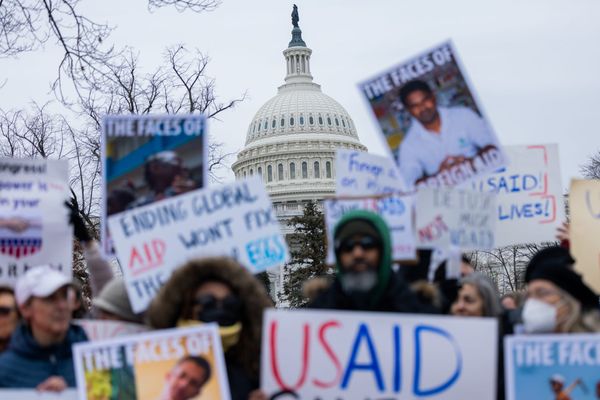
The United States has become increasingly worried about Thailand falling under China’s influence, former US military and civilian officials said, with Beijing applying significant pressure on the US ally in South-East Asia to purchase Chinese-made submarines.
Although the roughly US$400 million deal — first inked in 2017 to Washington’s chagrin — now appears to be threatened, with a German-based company refusing to provide diesel engines for the submersible, it shows China’s growing influence with the United States’ nearly two century-year-old treaty ally, part and parcel of Beijing’s increasing reach in South-East Asia.
Bangkok has grown tired of Washington’s chiding over democratic backsliding and human rights abuses, highlighted by coup attempts in 2006 and 2014, the second of which temporarily led the United States to suspend military aid and put current Thai Prime Minister Prayuth Chan-ocha in power. Some in Washington (and inside the Thai parliament) fear that Thailand could veer further toward the path of the Philippines, another long-time US ally that has cosied up to Beijing in recent years.
“The recipe is there; all of the ingredients are there,” said Lyle Morris, a senior policy analyst at the Rand Corporation and a former US Defense Department official. “They’ve already invested in a lot of the defense industrial base with the subs and more arms being sold from China to Thailand. That’s how it starts: it’s building the relationships of the defense industrial base and having systems that are more amenable to China than to the US.”
“I don’t think Thailand is lost yet, but they definitely need some love,” Morris added.
The Biden administration tried to shore up bilateral relations by dispatching US Defense Secretary Lloyd Austin to the country this week, a visit sandwiched in between the Pentagon chief’s trip to the Shangri-La Dialogue in Singapore and back-to-back meetings at NATO headquarters to provide more aid to Ukraine and prepare for NATO’s Madrid summit.
Senior US defence officials insisted that their visit to the region is not to tell South-East Asian nations to choose between the United States and China but to listen to their concerns as military tensions intensify in the region. Top of mind for Austin is helping South-East Asia, which has historically relied on Russian-sourced military equipment, to get more US arms, including finalising the sale of F-15 jets to Indonesia.
Like the battle over arms sales, the United States and China have also competed to lay claim to regional outposts. Vietnam once had the largest US naval base outside the continental United States, and the Philippines for long boasted major US naval and air installations. But in recent years, China has moved into the neighbourhood, including reportedly inking a deal to get exclusive access to a large chunk of a naval base in Cambodia on the Gulf of Thailand this month.
But the bigger issue isn’t bases or weapons sales but influence. China has coupled deep-pocketed development financing with a no-strings approach to economic statecraft.
“The real issue is influence. It’s not about the weapons systems themselves for the Chinese,” said Brent Sadler, a military expert at the Heritage Foundation. “And so, if they’ve gotten the policies and decisions out of the Thais, they could really care less” about the $400 million submarine deal.
As one of the United States’ half-dozen treaty allies dating back to the early years of the Cold War, Thailand still buys hundreds of millions of dollars of US weapons and has trained and exercised along US forces for years. But Chinese influence expanded after US officials were critical of the 2014 coup that catapulted Prayuth into power, and US foreign policy in the embattled country stagnated under the Trump administration, Thai lawmakers said.
“America pretty much was absent in Thailand in all grounds,” said Pita Limjaroenrat, a Thai businessman who leads the Move Forward Party. “Military exercises were just out of the question. That’s why strategic reliance turned all the way to China — 90%. Not Europe, not America, only China.”
Prayuth, the mercurial Thai leader, faces possible political headwinds, with opposition leaders in Bangkok likely preparing a no-confidence vote after independents scored victories in a recent gubernatorial election. But Chinese influence could be harder to uproot. Experts see the likely parliamentary vote as a potential bellwether, with Prayuth cracking down heavily on recent student-led street demonstrations that bubbled up after the coronavirus pandemic. Hundreds of people were arrested, and some were put under home detention even after they left police custody.
“If the Prayuth government remains in power, greater authoritarianism and a further lean towards China are very likely,” said Tyrell Haberkorn, a professor of South-East Asian studies at the University of Wisconsin-Madison. “Already, under the current semi-democratic, semi-authoritarian regime, there have been sustained attacks on human rights and freedoms.” On the other hand, Haberkorn said, a new government led by the Pheu Thai Party could give Thailand a greater chance of a pro-US tilt.
Ever since the Thai coup of 2006, the top US-Thai joint military exercise in the country, Cobra Gold, has shrunk and now includes under 5000 participants, according to Gregory Raymond, an Australian scholar. “It’s hard not to see the shrinkage as anything but a reflection of tensions in the US-Thai alliance since the coups of 2006 and 2014, plus Thailand accommodating China,” Raymond tweeted this month. The Pentagon’s US Indo-Pacific Command, he said, “is simply not contributing the same level of resources”.
Haberkorn said Thailand has “increasingly leaned towards China” on routine cooperation, adopting compatible military and civilian technology. The two have also worked together to squash human rights since the 2014 coup, with Thailand cooperating on the rendition to China of Hong Kong dissident Gui Minhai in 2015.
But China could just as easily squander its apparent advantage in Thailand with a transactional approach to foreign affairs. In Africa and Latin America, big Chinese inroads were gradually undone by Beijing’s shortsighted diplomacy.
“They’ll promise the sky, deliver suitcases, buy you a villa on the beach somewhere in the south of France or Australia in order for that politician in that targeted country to make a decision at a specific time and on a specific issue that they want,” Sadler said.
“And as soon as they get the issue, they move on,” Sadler added. “It’s very transactional. The Chinese have something they want, and they’ll stop giving once they get what they want.”







